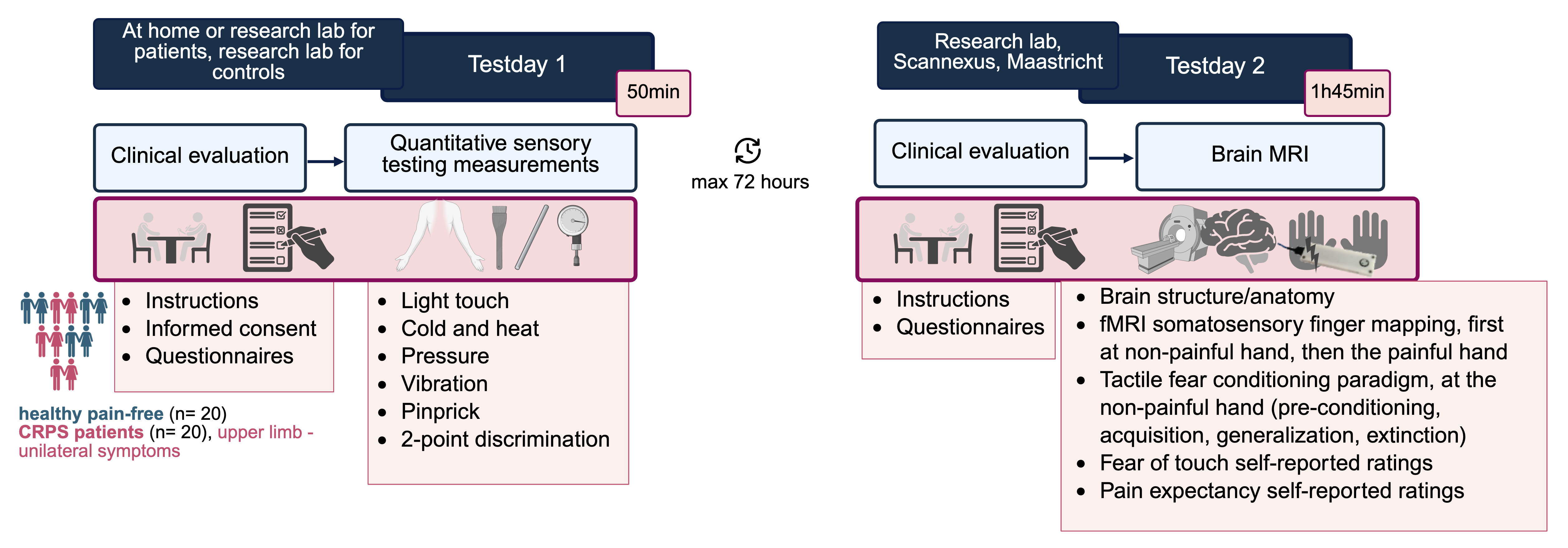FABrIC | Imaging fear of painful touch
Imaging fear of painful touch: unraveling relationships between neural correlates of pain-related fear, somatosensory neuroplasticity, and sensory impairments in the context of chronic pain. A Marie Curie financed study by Iris Coppieters for the Experimental Health Psychology research group at the Faculty of Psychology and Neuroscience at Maastricht University.
The abstract | the experiment | the team
The abstract
Chronic pain affects > 20% of people worldwide leading to enormous personal suffering and economic burden. A key factor contributing to chronic pain disability that thus far has been neglected is fear of painful touch - a core symptom in people with complex regional pain syndrome (CRPS). FABrIC (FeAr of painful touch in the BraIn in Chronic pain) is a functional Magnetic Resonance Imaging (fMRI) study using a novel tactile fear conditioning paradigm. I will examine the neural correlates of acquisition, generalisation and extinction of fear of painful touch and interrelationships with somatosensory neuroplasticity, and sensory impairments in individuals with CRPS compared to healthy controls. Also, I will investigate how individual differences in vulnerability and resilience factors can modulate fear learning and how they affect pain-related outcomes. This MSCA project is groundbreaking and can yield novel insights in hypothesised intertwined underlying neural mechanisms of pain-related fear and relations with symptoms. I will uniquely and necessarily bridge the gap between different disciplines and pain researchers from physiotherapy, neuroscience, and psychology fields studying the same complex chronic pain disorder. Persons with CRPS endorsed the relevance of this project, which provides opportunities to alleviate the CRPS stigma and improve treatments based on newly gained insights. Maastricht University and the interdisciplinary outstanding research groups are ideal to perform this fellowship. The host developed and pioneered the tactile fear conditioning paradigm. This fellowship will provide the exceptional chance to synergistically combine my expertise of chronic pain and quantitative sensory testing with neuroscientific, neuroimaging, and threat-safety-learning expertise at the host, thereby crucially contributing to the establishment of my own independent chronic pain-brain research line, my career development and sustainable scientific collaborations.
The experiment
Our study will include two sessions on two test days (preferably max 72 hours in between, and within one week). The first session will take approx. 50 minutes, and the second session maximum 1 hour and 45 minutes.
The first session will include filling out questionnaires by the participants, and performing quantitative sensory testing (QST) measurements by the researcher at the non-painful and painful upper limb. The second session will include questionnaires, the structural T1-weighted anatomical brain MRI scan, performing an fMRI finger mapping run first with vibrotactile stimulations at the non-painful hand, then the finger mapping run with stimulations at the painful hand, and performing a fMRI scan using the tactile fear conditioning paradigm with stimulations at the non-painful hand (pre-conditioning, acquisition, generalization, and extinction phase of task-based fMRI). Please the image below consult for an overview of the study design, and below for further methodological details. For the healthy pain-free persons the procedures will also take place at both upper limbs, and at a matched side with a patient for the tactile fear conditioning paradigm.
All procedures are specifically performed for this study and no diagnostic procedures or treatment will be postponed, although stability of medication and treatment will be asked and reviewed during the course of the study (the period in which the testing days take place). No invasive procedures will take place.

The team
Dr. Iris Coppieters
Principal Investigator
Prof. dr. Ann Meulders

Prof. dr. Inge Timmers

Dr. Emma Biggs
